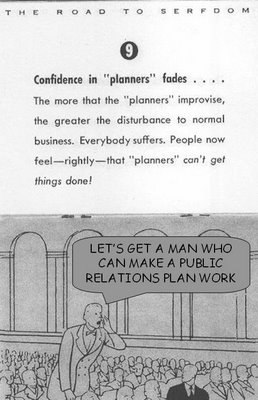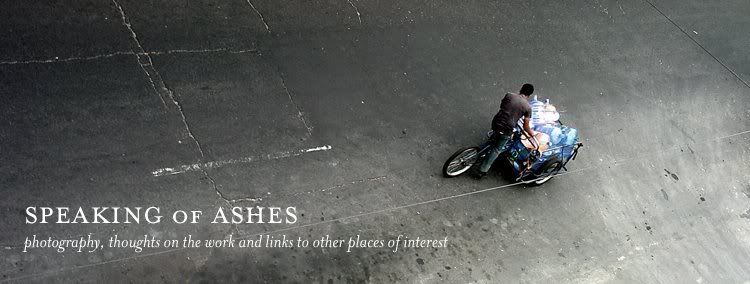 I took this cartoon from this ridiculous Hayek Road to Serfdom over here at where-ever. Altered only slightly, it amazes me that the freaks still rallying behind this kind of ludicrous pastiche, are also the ones who have been shrieking for the "strong man" since Nixon pulled his rat's tail into the helicopter. I was led to the Hayek piece by the folks at Liberty and Power: Group Blog.
I took this cartoon from this ridiculous Hayek Road to Serfdom over here at where-ever. Altered only slightly, it amazes me that the freaks still rallying behind this kind of ludicrous pastiche, are also the ones who have been shrieking for the "strong man" since Nixon pulled his rat's tail into the helicopter. I was led to the Hayek piece by the folks at Liberty and Power: Group Blog.
I wish to thank Steven LaRose over at Fish or Cut Bait for the careful consideration of the cartoons I published a couple of days ago. I think he is quite right to question the use of the phrase Radical Subjectivism, and I will explain my first experience of the term which is, sloppily of course, from art school. I have heard the phrase applied to people who take the position that "everything is, can and should be art, therefore: (a) it is pointless to try to teach anything other than a sort of mushy thinking about art and (b) any criticism you make of any art is reflective primarily on you, the critic." On researching a (very) little, I would suggest my use of "Radical Subjectivism is closer to what is expressed in this wikipedia entry under Metaphysical Subjectivism. Though I have also always thought there is a strong hint of Solipsismin such a position also.
Because what we're doing is playing a game, seeing if we can stretch our understanding and learn something, I very much applaud Steven's bringing in the Buchanan & Vanberg paper. The quote Steven pulls, "[Socialism failed] because it allowed little scope for the exercise of creative choice on the part of the participants in the economic process" reminds me quite easily of another such choice economic text that posited that socialism had failed because it was unable to communicate such creative choices back to the planners. Preseumably capitalism or socialism will understand this failed communication as a warehouse full of unsold goods. Capitalism is better at communicating these exercises of creative choice by the sale or rejection of said good or services. Now I don't know that any of us who are against capitalism are arguing for a planned economy in Hayek's rather childish sense, but my thinking has been about an economy of language.
Lately of course I have been hosting and encouraging a discussion of the Art Renewal Center with some very thoughtful and insightful posts and problems posed. And I keep trying to bring the discussion back to just what is it that is so much more useful to me as an artist about 19th century art rather than 20th century art. I think, after the cartoons, which were rather useful for me to conceptualize and which are of course still open to editing , improvement and discussion I can conclude that what is useful to artists, though not to the ARC itself, is that 19th century art simply contains more "linguistic elements" than 20th century art.
Stated simply, all painting is necessarily self-referential. That is to say of course, that if I make a painting it is by default a reference to all other paintings and to "painting" as an idealistic concept. That is why I say that abstraction is impossible. At best an abstract painting can only hint at what previous abstract painters intended to achieve. This notion of linguistic elements is of course problematic and draws on the need for artists to trundle their ways through a bit more Wittgenstein than I can go into here. Painting such as we find predominantly in the 19th century and prior is better able to transcend its own self-referentialism and actually communicate something beyond the "meta-communication" of being about art, and thus is able to actually communicate.
The "white-hot contemporary art market" though, self-referential as it is, primarily works with reference to language developed in the last 20 years. Bad paintings now refer to paintings from the 80s, abstract paintings refer roughly to "painting" between the 40s and 60s. All of them refer to the "Famous for 15 minutes," though not to the exclusivity crushing "Everyone will be." I suppose a rather cartoonish statement in and of itself. I am going to speak about this and Public Relations in a subsequent post.
 I took this cartoon from this ridiculous Hayek Road to Serfdom
I took this cartoon from this ridiculous Hayek Road to Serfdom 

Thanks for taking these thoughts a little further. And thanks for the Washington youtube link. Learning and smirking is one of my most favorite combinations.
ReplyDeleteI think one can smirk, I enjoy it tremendously, but it is important to distinguish between that and cynicism about art.
ReplyDeleteThe music people I know can pull off videos and songs like that washington video with hardly a smile, i really thought it was brilliant on a number of levels.